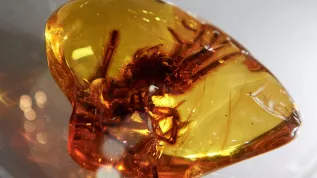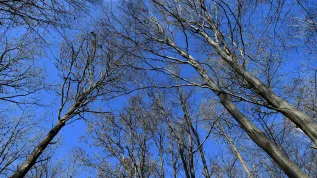Expert: Invasive plant species pose a huge threat to native flora

15.06.2025 updated: 15.06.2025
2 minutes of reading
Invasive plant species affect the composition of native flora by entering it and changing its relationships. Some of them may also pose a threat to our health - Dr. Ewa Zaraś from the Department of Environmental Protection and Dendrology at the Warsaw University of Life Sciences (SGGW) told PAP.
Invasive plant species are those that have been introduced by humans, either intentionally or unintentionally. Their seeds can accompany other products, plants or animals.
According to Dr. Hab. Ewa Zaraś from the Department of Environmental Protection and Dendrology at the Warsaw University of Life Sciences, alien species have "very broad ecological spectrums" and can live in various places. They are divided into annual plants and trees and shrubs. These include, among others, red oak, ailanthus glandularis and American bird cherry. Among herbaceous plants, the most notable are the goldenrod and the goldenrod late.
According to the expert, due to their enormous development potential, the spread of alien species "has a massive character and as a result, the environment becomes monocultural". According to Zaraś, these plants pose a real, enormous threat to native plants. They influence the change in the composition of native flora by entering it and changing its relationships. As a result, they push out weaker species, which - due to climate change - have a harder time growing.
Alien species also largely fill the place of species that cannot adapt evolutionarily to climate change. According to the expert, the presence of these plants is only an apparent benefit, the negative effects of which may fully manifest in the future. Invasive species, as they spread, also attract new insects, primarily entomological pests and other plant pathogens.
With their presence, plants affect the perception of the landscape and the social aspect. The expert emphasized that many invasive species are used as ornamental plants, including in home gardens and parks. They can penetrate through root systems or sow on their own. In her opinion, we should pay special attention to the beautiful-looking Sakhalin knotweed and Sosnowsky's hogweed, which "can pose a real threat to our health" on warm days. (PAP)
kpr/ zuz/ mhr/
The PAP Foundation permits free reprinting of articles from the Nauka w Polsce Service, provided that you inform us by e-mail once a month about the use of the service and provide the source of the article. In portals and internet services, please include the linked address: Source: naukawpolsce.pl, and in journals the annotation: Source: Nauka w Polsce Service - naukawpolsce.pl. The above permission does not apply to: information from the "World" category and any photographs and video materials.
Before adding a comment, please read the Forum Rules of Nauka w Polsce.
Dear Reader, In accordance with the Regulation of the European Parliament and of the Council (EU) of 27 April 2016 on the protection of natural persons with regard to the processing of personal data and on the free movement of such data, and repealing Directive 95/46/EC (General Data Protection Regulation), we inform you about the processing of your data. The data administrator is the PAP Foundation, with its registered office in Warsaw at ul. Bracka 6/8, 00-502 Warsaw. This concerns data that is collected as part of your use of our services, including websites, services and other functionalities provided by the PAP Foundation, mainly saved in cookies and other online identifiers that are installed on our websites by us and our trusted partners of the PAP Foundation. The collected data is used only for the purposes of: • provision of services electronically • detecting abuses in services
• statistical measurements and service improvement
The legal basis for data processing is the provision of the service and its improvement, as well as ensuring security, which constitutes the legitimate interest of the administrator. Data may be made available at the request of the data administrator to entities authorized to obtain data under applicable law. The data subject has the right to access the data, rectify and delete the data, limit their processing. The person may also withdraw consent to the processing of personal data.
Please send any notifications regarding the protection of personal data to [email protected] or in writing to Fundacja PAP, ul. Bracka 6/8, 00-502 Warsaw with the note "personal data protection"
More information about the principles of personal data processing and the User's rights can be found in the Privacy Policy. Find out more. I agree
naukawpolsce.pl







